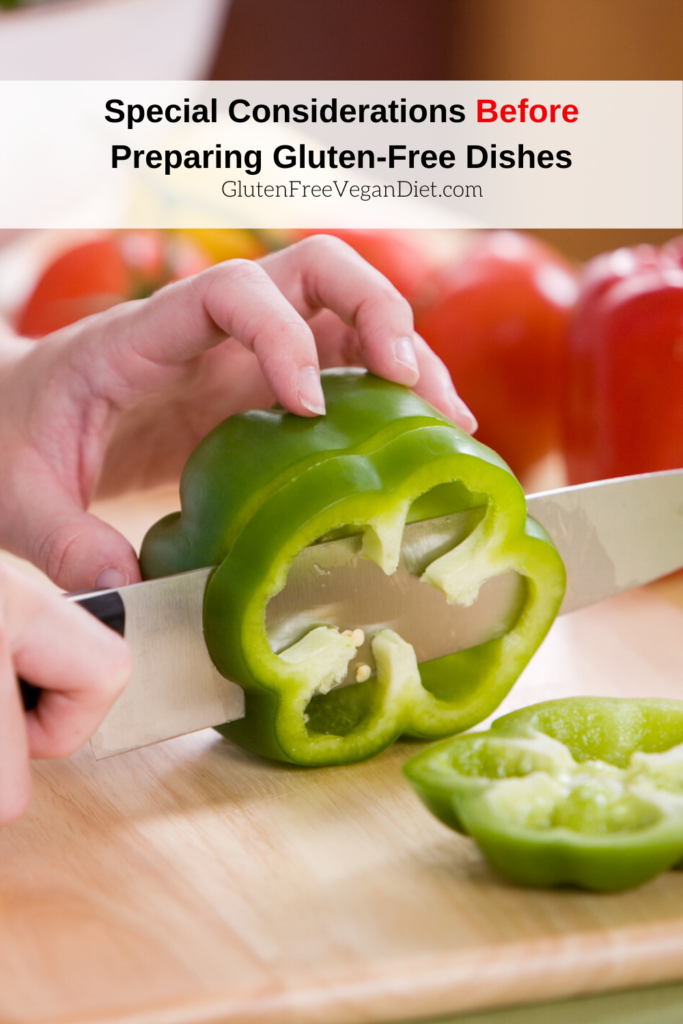Going gluten-free isn’t quite as simple as just avoiding foods that contain gluten. Unlike other diets that have rules such as not consuming too much carbs or eating more fat, the gluten-free diet requires you to completely eliminate all gluten from your diet. Failing to carefully do this could be a matter of life or death to many.

There are definitely some special considerations to consider whether eating out or preparing meals at home.
For people suffering from celiac disease, this is a very important issue. Making mistakes can lead to major health issues which could be very dangerous. There are some unique challenges when eating out, cooking for the family, or simply deciding what to eat when you must be gluten-free.
Here’s an example: I ate out with friends last week. I scoured the menu looking for the gluten free options. I found one with teriyaki sauce but didn’t think to ask if the sauce was in fact gluten free. I reacted an hour or so later and can only suspect that teriyaki cause. I was so focused on making sure the bun(bread) was gluten-free, I failed to pay attention to seasonings, etc.
Since most people on a gluten-free diet will usually cook for themselves, they’ll need to take a few special considerations into account. In this article, you’ll find a few pointers that are easy to overlook. I know there are some I never even considered in my own household.

Be sure to memorize these or better yet, print out the list and stick it on your refrigerator door so that you’re always vigilant. The following pointers are not all inclusive but are likely some you never even considered:
- Throw away your old breadboards and chopping boards
If you’re new to the gluten-free diet, throwing away the old boards will ensure that no gluten that’s hidden in the crevices of the board ends up on your food. Sometimes washing the boards repeatedly may not be enough. You’ll need to get new ones. - Get new sponges and dishwashing towels
Old sponges and towels that are used to dry your dishes may contain traces of gluten too. It may be surprising at just how easy it is for your food to get cross-contaminated. - Clean out your refrigerator
If you live alone, this is much easier. You can give your refrigerator a good clean out and throw out all foods containing gluten and set aside the foods that you suspect contain gluten.
Later, you can check if these suspect foods really are gluten-free or not. Keep those that are and discard those that aren’t.
If you have family sharing the refrigerator with you, it would be best to get a separate fridge for yourself… or you’ll need to be very careful to keep your ingredients and foods separate from the other foods in the same fridge - Your stove, toaster and microwave
Bits and pieces of food can always be left behind in these appliances. Clean them thoroughly. Ideally, if you have a toaster, it’s best to either toss it out or give it away to someone else. Crumbs in the toaster oven are really difficult to get rid of completely and it’s easier to get a new one for your gluten-free bread.
Basically, you want to remove ALL traces of gluten in these areas before preparing any meals. - Sinks, cupboards and countertops
Every single area where food is prepared, stored on displayed should be cleaned. Vacuum all crumbs and wipe down the areas with a wet cloth. - Throw out ALL foods containing gluten
Once again, this is easier if you live alone. By not having any foods containing gluten in your house, not only will cross-contamination be much less likely to occur, but you’ll also not accidentally eat what you’re not supposed to.
This has been a huge challenge for me with a teen living in my house. My daughter can eat just about anything she likes and many of my kitchen surfaces are shared. Diligence is a must here.
It will be a massive chore to do all that’s stated in this article… and you’ve not even started cooking yet. However, you only need to do it once to get your gluten-free diet off to a clean and new start. After that, it’ll be smooth sailing all the way, relatively.

I hope you found this article helpful in your quest to go gluten-free. Leave a comment below with your #1 tip. You can also contact me if you have questions or comments.

